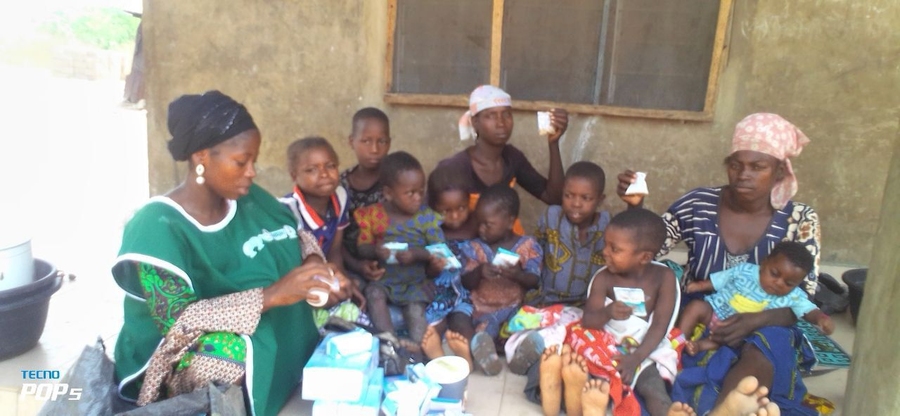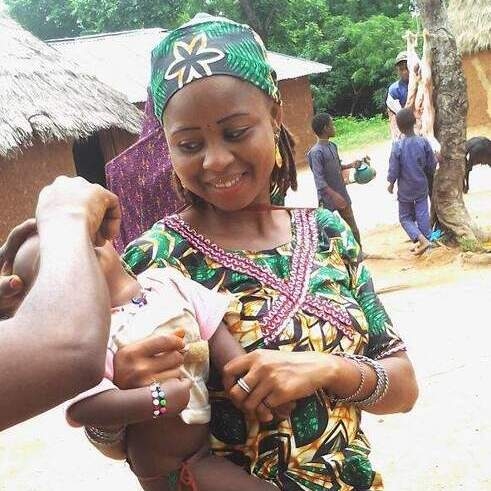M’Care and MIT students join forces to improve child health in Nigeria
 Mothers and children receive various vitamins for their household. A community health worker is also registering these individuals so they receive a continuum of care. Photo courtesy M'Care.
Mothers and children receive various vitamins for their household. A community health worker is also registering these individuals so they receive a continuum of care. Photo courtesy M'Care. Through a collaboration between M’Care, a 2021 Health Security and Pandemics Solver team, and students from MIT, the landscape of child health care in Nigeria could undergo a transformative change, wherein the power of data is harnessed to improve child health outcomes in economically disadvantaged communities.
M’Care is a mobile application of Promane and Promade Limited, developed by Opeoluwa Ashimi, which gives community health workers in Nigeria real-time diagnostic and treatment support. The application also creates a dashboard that is available to government health officials to help identify disease trends and deploy timely interventions. As part of its work, M’Care is working to mitigate malnutrition by providing micronutrient powder, vitamin A, and zinc to children below the age of 5. To help deepen its impact, Ashimi decided to work with students in the MIT Computer Science and Artificial Intelligence Laboratory (CSAIL) course 6.S897 (Machine Learning for Healthcare) — instructed by professors Peter Szolovits and Manolis Kellis — to leverage data in order to improve nutrient delivery to children across Nigeria. The collaboration also enabled students to see real-world applications for data analysis in the health care space.
A meeting of minds: M’Care, MIT, and national health authorities
“Our primary goal for collaborating with the ML for Health team was to spot the missing link in the continuum of care. With over 1 million cumulative consultations that qualify for a continuum of care evaluation, it was important to spot why patients could be lost to followup, prevent this, and ensure completion of care to successfully address the health needs of our patients,” says Ashimi, founder and CEO of M’Care.
In May 2023, Ashimi attended a meeting that brought together key national stakeholders, including the representatives of the National Ministry of Health in Nigeria. This gathering served as a platform to discuss the profound impact of M’Care’s and ML for Health team’s collaboration — bolstered by data analysis provided on dosage regimens and a child’s age to enhance continuum of care with its attendant impact on children’s health, particularly in relation to brain development with regards to the use of essential micronutrients. The data analyzed by the students using ML methods that were shared during the meeting provided strong supporting evidence to individualize dosage regimens for children based on their age in months for the ANRIN project — a national nutrition project supported by the World Bank — as well as policy decisions to extend months of coverage for children, redefining health care practices in Nigeria.

A child receives vitamin A from a community health worker. Photo courtesy M’Care.
MIT students drive change by harnessing the power of data
At the heart of this collaboration lies the contribution of MIT students. Armed with their dedication and skill in data analysis and machine learning, they played a pivotal role in helping M’Care analyze their data and prepare for their meeting with the Ministry of Health. Their most significant findings included ways to identify patients at risk of not completing their full course of micronutrient powder and/or vitamin A, and identifying gaps in M’Care’s data, such as postdated delivery dates and community demographics. These findings are already helping M’Care better plan its resources and adjust the scope of its program to ensure more children complete the intervention.
Darcy Kim, an undergraduate at Wellesley College studying math and computer science, who is cross-registered for the MIT machine learning course, expresses enthusiasm about the practical applications found within the project: “To me, data and math is storytelling, and the story is why I love studying it. … I learned that data exploration involves asking questions about how the data is collected, and that surprising patterns that arise often have a qualitative explanation. Impactful research requires radical collaboration with the people the research intends to help. Otherwise, these qualitative explanations get lost in the numbers.”
Joyce Luo, a first-year operations research PhD student at the Operations Research Center at MIT, shares similar thoughts about the project: “I learned the importance of understanding the context behind data to figure out what kind of analysis might be most impactful. This involves being in frequent contact with the company or organization who provides the data to learn as much as you can about how the data was collected and the people the analysis could help. Stepping back and looking at the bigger picture, rather than just focusing on accuracy or metrics, is extremely important.”
Insights to implementation: A new era for micronutrient dosing
As a direct result of M’Care’s collaboration with MIT, policymakers revamped the dosing scheme for essential micronutrient administration for children in Nigeria to prevent malnutrition. M’Care and MIT’s data analysis unearthed critical insights into the limited frequency of medical visits caused by late-age enrollment.
“One big takeaway for me was that the data analysis portion of the project — doing a deep dive into the data; understanding, analyzing, visualizing, and summarizing the data — can be just as important as building the machine learning models. M’Care shared our data analysis with the National Ministry of Health, and the insights from it drove them to change their dosing scheme and schedule for delivering micronutrient powder to young children. This really showed us the value of understanding and knowing your data before modeling,” shares Angela Lin, a second-year PhD student at the Operations Research Center.
Armed with this knowledge, policymakers are eager to develop an optimized dosing scheme that caters to the unique needs of children in disadvantaged communities, ensuring maximum impact on their brain development and overall well-being.
Siddharth Srivastava, M’Care’s corporate technology liaison, shares his gratitude for the MIT student’s input. “Collaborating with enthusiastic and driven students was both empowering and inspiring. Each of them brought unique perspectives and technical skills to the table. Their passion for applying machine learning to health care was evident in their unwavering dedication and proactive approach to problem-solving.”
Forging a path to impact
The collaboration between M’Care and MIT exemplifies the remarkable achievements that arise when academia, innovative problem-solvers, and policy authorities unite. By merging academic rigor with real-world expertise, this partnership has the potential to revolutionize child health care not only in Nigeria but also in similar contexts worldwide.
“I believe applying innovative methods of machine learning, data gathering, instrumentation, and planning to real problems in the developing world can be highly effective for those countries and highly motivating for our students. I was happy to have such a project in our class portfolio this year and look forward to future opportunities,” says Peter Szolovits, professor of computer science and engineering at MIT.
By harnessing the power of data, innovation, and collective expertise, this collaboration between M’Care and MIT has the potential to improve equitable child health care in Nigeria. “It has been so fulfilling to see how our team’s work has been able to create even the smallest positive impact in such a short period of time, and it has been amazing to work with a company like Promane and Promade Limited that is so knowledgeable and caring for the communities that they serve,” shares Elizabeth Whittier, a second-year PhD electrical engineering student at MIT.
Media Inquiries
Journalists seeking information about EECS, or interviews with EECS faculty members, should email eecs-communications@mit.edu.
Please note: The EECS Communications Office only handles media inquiries related to MIT’s Department of Electrical Engineering & Computer Science. Please visit other school, department, laboratory, or center websites to locate their dedicated media-relations teams.